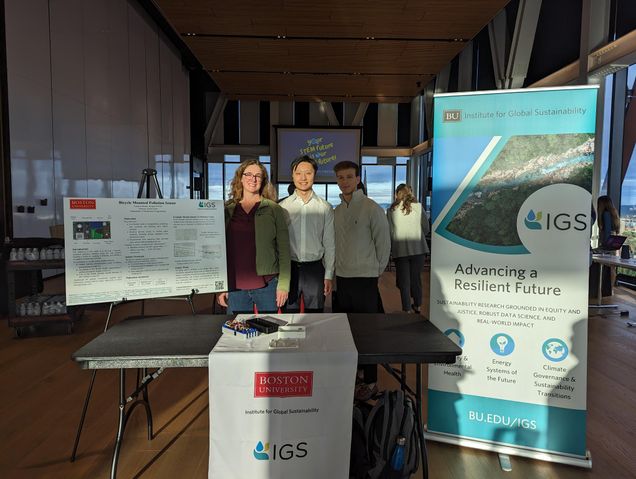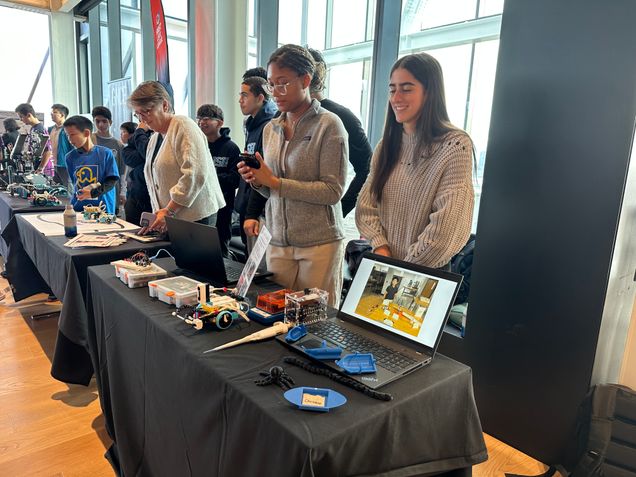BU hosts Lt. Gov. and BPS students at annual STEM fair
On a cool Monday in October, Boston University hosted Massachusetts Lt. Governor Kim Driscoll, Education Secretary Patrick Tutwiler, and students from all over Boston to kick off Massachusetts STEM Week. Public elementary, middle, and high school students filled the 17th floor of the Center for Computing & Data Sciences to peruse posters and displays highlighting BU STEM research projects—and to hear about the work directly from the BU student researchers, many of them just a few years older than the high schoolers.
The idea was to encourage a diverse community of local students to envision themselves in STEM fields and show them concrete examples of the educational and career opportunities available in those fields. Tackling climate change was the theme for this year’s STEM Week.
“We depend on the math, science, technology, and engineering students of today to be the industry leaders of tomorrow,” Driscoll said in her remarks. “And in the context of the global climate crisis, Massachusetts also depends on future STEM leaders and innovators to deliver progress and sustainable solutions as we fight for a cleaner planet.”
 For example, mechanical engineering students Nahiyan Muhammad (ENG’25) and Inal Shomakhov (ENG’26) presented their project, a water surface litter collector to trawl the Charles River for trash, especially non-degradable plastics. Advised by Associate Professor Ray Nagem (ME), Muhammad and Shomakhov are designing an energy-free pressure pump and researching filtering methods as well as sustainable materials to be used in manufacturing the device.
For example, mechanical engineering students Nahiyan Muhammad (ENG’25) and Inal Shomakhov (ENG’26) presented their project, a water surface litter collector to trawl the Charles River for trash, especially non-degradable plastics. Advised by Associate Professor Ray Nagem (ME), Muhammad and Shomakhov are designing an energy-free pressure pump and researching filtering methods as well as sustainable materials to be used in manufacturing the device.
Lorenzo Barale (ENG’25) and Benjamin Pedi (ENG’25), also ME students, pitched their bicycle-mounted air pollution monitors. With Associate Professor Emily Ryan (ME, MSE) advising, the pair are developing a sensor pack to measure pollutant levels. Outfitting bikes with such packs, the researchers hope to collect air quality data around the city to help determine public policy related to transportation, green space, and public housing.
 In addition, several ENG students in BU’s TISP program set up a table to demonstrate Lego Robotics, Arduino, mini PCR, 3D printing and other projects that they teach in some 14 Boston Public Schools. Through engaging, interactive TISP workshops, BU students hone their own communication skills while they show younger kids how engineering can transform lives, says ENG Assistant Dean for Outreach & Diversity Pamela Audeh.
In addition, several ENG students in BU’s TISP program set up a table to demonstrate Lego Robotics, Arduino, mini PCR, 3D printing and other projects that they teach in some 14 Boston Public Schools. Through engaging, interactive TISP workshops, BU students hone their own communication skills while they show younger kids how engineering can transform lives, says ENG Assistant Dean for Outreach & Diversity Pamela Audeh.
“Teaching engineering to young students is a dual gift, nurturing the minds of the next generation while simultaneously enriching the college students involved,” says Audeh. “As a result, young students see themselves as future engineers, learn about the field and the path to becoming an engineer, gain experience and confidence in their abilities, and envision themselves as problem-solvers contributing to their community and world.”
